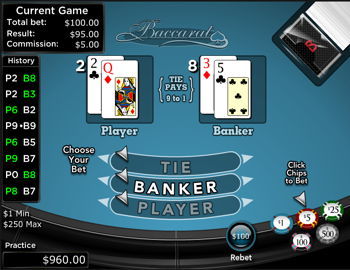How to Play Baccarat
Last update: August 2018
A great game
Baccarat (pronounced BAH-kah-rah) is a card game that's
especially popular with Asian players. James Bond
also played it in one of the movies. The house
edge is a mere 1.06%, making it one of the best bets in the
casino. It's also one of the simplest card games around,
because there's not really any strategy. It's kind of like
roulette: You choose what you want to bet on, then the dealer
does her thing, and you see whether you won or lost. There's
no deciding whether to hit, stand, raise, or any of that. Just
pick your bet and wait to see the result. That's it. So
it's a good game for those graduating from slots, who want a better
chance of winning, and to stop losing money hand over fist.
 How
to Play
How
to Play
Two hands are dealt, and the higher hand wins. Before they're dealt, you decide which hand to bet on. Or, you could bet that they'll tie.
One hand is called "Banker" and the other called "Player", but that's purely arbitrary. The "Banker" hand has nothing to do with the casino, and the "Player" hand has nothing to do with you. They might as well call the hands Hand 1 and Hand 2. Note also that there's only one "Player" hand dealt no matter how many players there are, because the "Player" hand isn't really the player's hand, it's just one of the choices you can bet on.
There's no such thing as busting in Baccarat. Only the last digit of the total is counted. For example, 9+5 is really 4 (not 14). And 6+5 is 1 (not 11).
Aces count as 1, and face cards have no value.
Initially two cards are dealt to each hand, and complicated rules
determine whether a third card is dealt to either hand. You
don't have to worry about this, because if a third card needs to be
dealt, the dealer will deal it automatically. But for those
who want to know, the third-card conditions are listed further down.
Strategy
Betting on Player has a house edge of 1.24%, and betting on Banker usually has an edge of 1.06%, so you'll get the best odds by betting on Banker every single time. That's true even if Player has just come up five times in a row. (see why) Of course, I know that most people will get bored making the same bet over and over, so I'll understand if you want to bet on Player on occasion. The house edge on the Player bet (1.24%) is only a little worse than it is on banker bet, so it won't kill your odds to bet on Player on occasion. Just don't ever bet the Tie bet, which carries a whopping 10% house edge.
You'll pay a 5% commission on winning Banker bets. (And yes, the 1.06% house edge is after you pay that 5% commission.) The dealer keeps track of the commission and you pay it when you at the end of your session. So, make sure you save some money to pay your commission!
Commissions are usually rounded up to the next 25¢, so make sure to bet in multiples of $5, otherwise you'll pay more than 5% in commissions. For example, if you bet $6, the nominal 5% commission would be 30¢, but the casino will round that up to 50¢. And 50¢ on a $6 bet is a whopping 8.3%. Here's my calculator to show you the house edge on various bet sizes.
| Commission Calculator | |
| Bet amount | |
| Commission rate | |
| House edge on Banker Bet | |
This is a bigger problem with online casinos where you can bet as little as $1. The nominal 5% commission on a $1 bet would be 5¢, but many online casinos (including Bovada) round that up to the nearest 25¢. So a 25¢ commission on a $1 bet is a whopping 25%! So if you're playing online for less than $5 per hand, stick to the Player bet instead of the Banker bet.
Binion's Horseshoe in Downtown Vegas took only a 4% commission on the Banker bet for years until they went out of business in 2003. They reopened with a new owner but didn't resurrect the 4% commission.
What the play is like
In the snooty Baccarat rooms with the high table limits, each player gets a turn to deal the cards. On the casino floor there's no such perk, but some casinos like the Orleans will deal the cards to a player so the player can turn them over.
Baccarat is appealing because there's no strategy to learn. Most games with a low edge require you to learn some strategy, but with Baccarat, you get the some low edge no matter what, because the only decisions you make are how much to bet and which of the two low-edge hands you want to bet on, Player or Banker. The only way to screw this up is to make the Tie bet which carries a high edge.
If you play with Asians then the play is generally very slow, because they take a long time to make their betting decisions. It's even slower if the casino lets them handle the cards. That's good for you, because the slower you play, the less you'll lose. Check that out in the calculator:
| Average Loss Calculator | |||||
| Game | Rounds / Rolls Per Hour |
Bet per round | House Edge |
Average
Avg.
Loss for hour(s) hrs of play |
|
| Slots | $ | ||||
| Roulette | $ | ||||
| Video Poker | $ | ||||
| Baccarat | $ | ||||
| Craps |
ROLLS per hour
|
$ | |||
| Blackjack | $ | ||||
| These are mathematical averages. You could lose more or less. Craps edge is per roll. | |||||
| Play online casino games with fake money! It's better than losing real money. | |||||
When you play, you'll notice the other players meticulously
keeping track of which hands won. They're looking for
trends so they can figure out whether Player, Banker, or Tie is
"due". All this effort is completely wasted, though, because
the past rounds have no bearing on the next round. It's like
when you toss a coin—it doesn't matter what came up before, the
chances of heads on the next flip are always 50/50. There's
more about this on our page about the Gambler's
Fallacy.
You can play
baccarat online for free at Bovada, with no registration
required. One click and you're in.
Drawing rules
Here are the rules which determine whether a third card is dealt, just as FYI—because you have no choice about whether a third card is drawn, and you can't base any strategy on it.
- Both player and banker get two cards each.
- If either side has 8 or 9, both sides stand.
- If Player's total is 6-7, Banker draws on totals of 0-5.
- If Player's total is 0-5, Player draws a card, then Banker plays
as follows:
- Banker's total is 0-2: Always draw
- Banker's total is 3: Draw unless Player's 3rd card is 8.
- Banker's total is 4: Draw if Player's 3rd card is 2-7.
- Banker's total is 5: Draw if Player's 3rd card is 4-7.
- Banker's total is 6: Draw if Player's 3rd card is 6-7.
Generate random baccarat shoes
For decades, players have been trying to figure out a way to beat casino games with betting systems, where you bet more or less depending on the outcome of previous rounds. It's a waste of time, it can't be done. The reason is that the result of a new hand is completely unrelated to what happened before. Every new hand is entirely random, so it's impossible to discern the outcome. Sure, you can observe patterns in hands that have already been played, but that gives you zero information about what's coming next. Thinking you can figure out a betting system is like thinking you can choose ten coins from a bunch of pennies, nickels, and quarters, and have the average somehow be above 25¢.
For those who insist on testing their betting system ideas, I wrote a program (below) to generate baccarat shoes randomly. But be warned: winning even 1000 hands proves nothing. It's quite possible to be ahead after 1000 hands from dumb luck. Someday I'll write a program to figure out how many hands are necessary to test to be 99.9% certain of being behind.
The PRNG used in the shoe-generator depends on what's in your browser, which is probably xorshift+128, which is more than adequate for this kind of testing.
If you find any errors in the output (e.g., the wrong side is listed as winning, a 3rd card is drawn when it shouldn't be or vice-versa), please let me know!
See also how to play:

